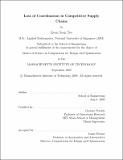Loss of coordination in competitive supply chains
Author(s)
Teo, Koon Soon
DownloadFull printable version (1.164Mb)
Other Contributors
Massachusetts Institute of Technology. Computation for Design and Optimization Program.
Advisor
Georgia Perakis.
Terms of use
Metadata
Show full item recordAbstract
The loss of coordination in supply chains quantifies the inefficiency (i.e. the loss of total profit) due to the presence of competition in the supply chain. In this thesis, we discuss four models: one model with multiple retailers facing the multinomial logit demand, and three supply chain configurations with one supplier and multiple retailers in a i) quantity competition among retailers with substitute products, ii) price competition among retailers with substitute products, and iii) quantity competition among retailers with complement products, producing differentiated products under an affine demand function. As a special case, we also consider the symmetric setting in the four models where all retailers encounter identical demand, marginal costs, quality dierences, and in the multinomial logit demand case, when there are identical variances in the consumers' utility functions. The main contribution in this thesis lies in the precise quantification of the loss of profit due to lack of coordination, through analytical lower bounds. We provide bounds in terms of the eigenvalues of the demand sensitivity matrix, or the demand sensitivities. For the multinomial logit demand model, the lower bounds are in terms of the number of retailers and the predictability of consumer behaviour. We use simulations to provide further insights on the loss of coordination and tightness of the bounds. We find that a supply chain with retailers operating under Bertrand competition offering substitute products is the most ecient with an average profit loss of less than 15%. We also nd that competitive supply chains can be coordinated when offering substitute products. (cont.) This occurs under the symmetric setting when there is a 'reasonable' number of Cournot retailers under intense competition, or when demand is 'more' inelastic in a Bertrand competition setting. As an example, in the presence of six Cournot retailers under intense competition, the profit loss is 2.04%, and when demand is perfectly inelastic in a Bertrand competition, the supply chain is perfectly coordinated with profit loss of 0%. For the multinomial logit demand case, we nd that higher predictability of consumer behaviour (i.e, when consumers' choices are more deterministic) increases profits both under coordination and under competition, and a larger number of retailers decreases profits under competition, but 3 increases profits under coordination. The net result is that efficiency 'deteriorates' when the number of competitive retailers and predictability of consumer behaviour increases.
Description
Thesis (S.M.)--Massachusetts Institute of Technology, Computation for Design and Optimization Program, 2009. This electronic version was submitted by the student author. The certified thesis is available in the Institute Archives and Special Collections. Cataloged from student submitted PDF version of thesis. Includes bibliographical references (p. 161-163).
Date issued
2009Department
Massachusetts Institute of Technology. Computation for Design and Optimization ProgramPublisher
Massachusetts Institute of Technology
Keywords
Computation for Design and Optimization Program.